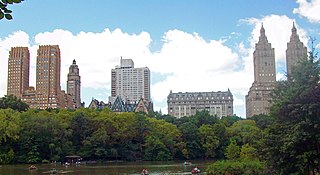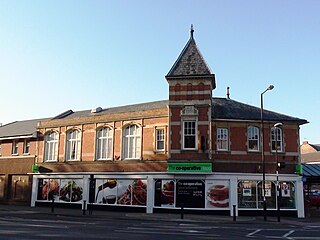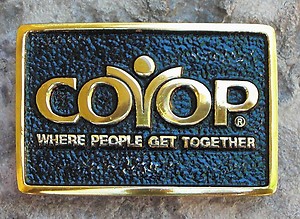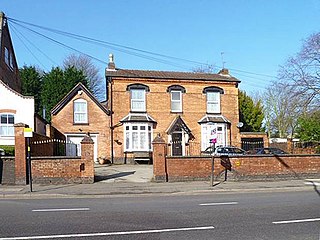Related Research Articles

A housing cooperative, or housing co-op, is a legal entity, usually a cooperative or a corporation, which owns real estate, consisting of one or more residential buildings; it is one type of housing tenure. Typically housing cooperatives are owned by shareholders but in some cases they can be owned by a non-profit organization. They are a distinctive form of home ownership that have many characteristics that differ from other residential arrangements such as single family home ownership, condominiums and renting.
The North American Students of Cooperation (NASCO) is a federation of housing cooperatives in Canada and the United States, started in 1968. Traditionally, NASCO has been associated with student housing cooperatives, though non-student cooperatives are included in its network. NASCO provides its member cooperatives with operational assistance, encourages the development of new cooperatives, and serves as an advocate for cooperatives to government, universities, and communities. NASCO teaches leadership skills, provides information, and serves as a central link in facilitating the fruition of the cooperative vision for students and youth.
Community of Urbana-Champaign Cooperative Housing, or COUCH, is an association of student housing cooperatives in Urbana and Champaign, Illinois. It is a member of North American Students of Cooperation (NASCO).

The Cloyne Court Hotel, often referred to simply as Cloyne, is a historical landmark in Berkeley, California and currently one of the houses of the Berkeley Student Cooperative (BSC), a student housing cooperative. It is located at the north side of the University of California, Berkeley campus at 2600 Ridge Road, near Soda Hall and Jacobs Hall, and is the next door neighbor of the Goldman School of Public Policy.
The Santa Barbara Student Housing Coop (SBSHC) is a student housing cooperative designed to provide affordable housing for students attending post-secondary institutions in Santa Barbara County. It is a member of NASCO. The first coop was established in 1976, and consists of five houses; Newman, Manley, Dolores, Biko and Merton. In all, just under 100 students live in these houses.

The Inter-Cooperative Council at the University of Michigan (ICC) is a student owned and operated housing cooperative serving students and community members in Ann Arbor, Michigan. The ICC is an active member of NASCO.
The Berkeley Student Cooperative (BSC) is a student housing cooperative serving primarily UC Berkeley students, but open to any full-time post-secondary student. The BSC houses and/or feeds over 1,300 students in 17 houses and three apartment buildings. Food is provided to residents of the 17 houses, which also offer boarding meal plans to non-residents. As part of their rental agreement, residents of the houses are required to perform workshifts, typically five hours per week. The BSC is led by a board of directors which is primarily composed of and elected by student members.

A consumers' co-operative is an enterprise owned by consumers and managed democratically and that aims at fulfilling the needs and aspirations of its members. Such co-operatives operate within the market system, independently of the state, as a form of mutual aid, oriented toward service rather than pecuniary profit. Many cooperatives, however, do have a degree of profit orientation. Just like other corporations, some cooperatives issue dividends to owners based on a share of total net profit or earnings ; or based on a percentage of the total amount of purchases made by the owner. Regardless of whether they issue a dividend or not, most consumers’ cooperatives will offer owners discounts and preferential access to good and services.
Madison Community Cooperative, or MCC, is a housing cooperative composed of 11 houses in Madison, Wisconsin with around 200 resident members.

Michigan Coöperative House was founded in 1932 as Michigan Socialist House. It was located at 335 E. Ann Street in Ann Arbor, Michigan, near the University of Michigan campus, and now is located at 315 N. State Street. It is one of the co-op houses making up the Inter-Cooperative Council. In 2016 Michigan Cooperative House and the neighboring Minnies Cooperative House voted to combine the two coops and become one functioning, democratically run cooperative.
A student housing cooperative, also known as co-operative housing, is a housing cooperative for student members. Members live in alternative cooperative housing that they personally own and maintain. These houses are designed to lower housing costs while providing an educational and community environment for students to live and grow in. They are, in general, nonprofit, communal, and self-governing, with students pooling their monetary and personal resources to create a community style home. Many student housing cooperatives share operation and governing of the house. As with most cooperatives, student housing coops follow the Rochdale Principles and promote collaboration and community work done by the members for mutual benefit.

The Two Dickinson Street Co-op, or 2D, is one of the five student dining co-ops at Princeton University in Princeton, New Jersey. 2D is a 50-member vegetarian cooperative located across the street from the Princeton University campus.
Spartan Housing Cooperative (SHC) is a nonprofit member owned and operated housing cooperative. The SHC was formed as in 1969, as a federation of existing student housing cooperatives in East Lansing. Since the first of the SHC's member houses formed 69 years ago, SHC has accumulated more than 4,000 members.
Escher Cooperative House, named after artist M. C. Escher, is one of the Inter-Cooperative Council at the University of Michigan's (ICC) 16 student housing cooperatives. It is located at 1500 to 1520 Gilbert Court in Ann Arbor, Michigan. The only North Campus-located cooperative, it is the ICC's largest community with over 150 spaces of residents and 9 separately themed "suites." It is also the only building in Ann Arbor built specifically for cooperative housing.

Consumers' Cooperative of Berkeley, informally known as the Berkeley Co-op, or simply Co-op, was a consumers' cooperative based in Berkeley, California, which operated from 1939 to 1988, when it collapsed due to internal governance disputes and bankruptcy. During its height, it was the largest cooperative of its kind in North America, with over 100,000 members, and its collapse has provoked intense discussion over how food cooperatives should be operated.

The Oberlin Student Cooperative Association (OSCA) is a non-profit corporation founded in 1962 that feeds and houses Oberlin College students. Located in the town of Oberlin, Ohio, it is independent from but closely tied to Oberlin College. OSCA is one of the largest student housing cooperatives in North America, though membership has declined in recent years.

Birmingham Student Housing Co-operative is a student housing cooperative in the United Kingdom, providing affordable self managed housing for the co-operative's nine student members. The co-operative was the first operational student housing co-operative in the UK when it opened in June 2014.

The University Cooperative Housing Association(UCHA) is a student housing cooperative in Westwood, Los Angeles near the University of California, Los Angeles (UCLA) campus. Able to house and feed over 400 members, the UCHA primarily offers housing to UCLA students, but welcomes members from any institution. The UCHA operates three buildings: Hardman-Hansen Hall (HHH or "Triple H"), Essene Hall, and Robison Hall. Jim Morrison of The Doors purportedly lived at the UCHA during his time at UCLA. Alongside the UCLA campus, Hardman-Hansen and Robison Halls were used as filming locations for the 1982 horror film, The Dorm That Dripped Blood. Many students of China's Lost Generation studying at UCLA resided at the UCHA.

Sheffield Student Housing Co-operative is a student housing cooperative in the United Kingdom, providing not-for-profit, self managed housing for the co-operative's members. The co-operative started organising in 2012. The project suffered delays due to planning and legal issues, and the first property was secured in 2015.
